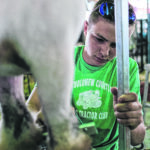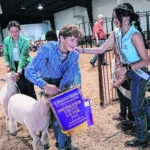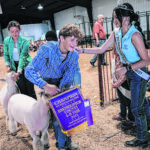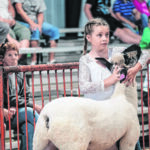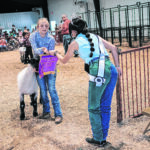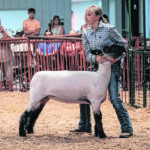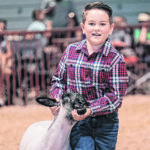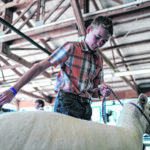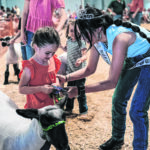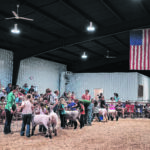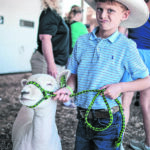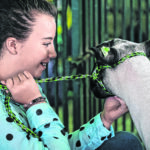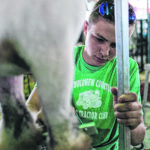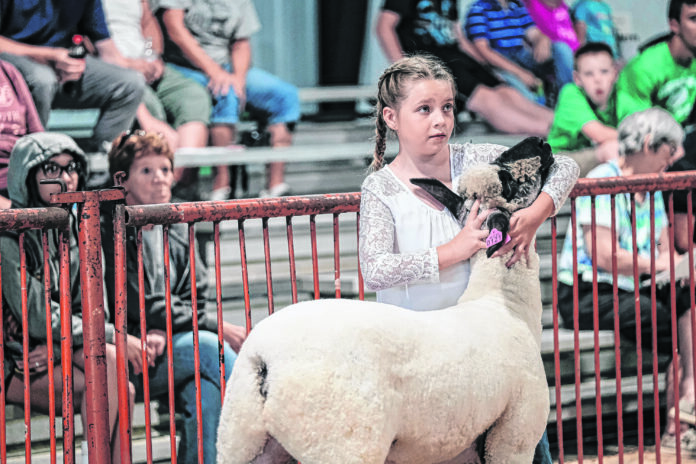
The number of entries was lower during the Bartholomew County 4-H Fair sheep show, a combination of a number of factors.
There were 40 animals entered in 22 classes, compared to 74 entries in 27 classes during last year’s competition. Two years earlier, there were 83 sheep displayed in 43 classes. There was no competition in 2020 because the fair was canceled.
Bartholomew County Extension Director Elisabeth Eaton said an unusually high number of tenured members who annually competed in the sheep show left 4-H after last year’s fair.
“There is a family who traditionally shows sheep that decided not to show this year,” Eaton explained. “We also have another family that usually competes, but they are vacationing at this time in Europe.”
Although membership in 4-H dropped when the fair was canceled two years ago by COVID-19 concerns, Smith says the overall number of club members continues to steadily rise.
An estimated 130 spectators kept the noise to a minimum during the competition.
In addition, the judge spoke in a pleasant and supportive voice to nearly each 4-H club member. Roger K. Carr of Columbia City is a retired agriculture teacher who supervises livestock competitions year-round.
Wednesday was an exceptional day for Lilly Steinwedel, who won both the Grand Champion ewe and Grand Champion “county born and raised” ewe trophies.
The 16-year-old Columbus East High School student said she has loved her winning Black Face Cross ewe from the start. While the lamb’s bone structure is larger than what Steinwedel might have preferred, that seemed to bother her more than Carr.
Like other exhibitors, Steinwedel said there are a few “beauty pageant” principles that apply to showing sheep.
“The judge loves to see something special, such as markings that catches their eye,” Steinwedel said. “You also want to get their legs fluffed out, so the judge will pay more attention to them.”
Another big winner was Drew Hoeflinger, 13, who received the Grand Champion Reserve award. Hoeflinger, who will enter eighth grade at Northside Middle School in August, says he has shown sheep at every local 4-H fair for the past five years. However, he says he has been participating in outside livestock competitions since he was 5 years old.
The son of Tim and Kelli Hoeflinger says raising sheep in the summer involves working with them in cooler temperatures.
“It’s very hard work, but hard work pays off,” the said.
The first championship award was presented to Gabby Ferrenburg, 11, for her Hampshire ewe. A student at St. Peter’s Lutheran School, Gabby says she has been exhibiting for about three years. She said the award-winning ewe has required about two hours of work each day for the past two years, especially during winter.
Prior to the competition, very young childen (ages 8 and younger) participated in the Lil’ Wranglers exhibition, which is designed to encourage kids too young for 4-H a taste of what displaying an animal is like.
Among the most adorable Lil’ Wrangers was Jed Keffaber, 8, who had no trouble keeping a hold of a Southdown ewe named Snowball. But just in case of trouble, Drew Hoeflinger kept close to Jed.
The unsung heroes of all of this week’s competitions are the parents. Ross Carothers, who resides near Elizabethtown, said he has no less than four children enrolled in 4-H clubs that range from age 13 to 17. All four children were showing pigs Tuesday, while two – Riley and Levi Carothers – also competed in Wednesday’s sheep show.
The commitment of a 4-H parent will depend on what species your child is raising, as well as whether you are raising your own or buying an animal and keeping it part of the year. For example, the Carothers family only obtain pigs for competition in March and sell them at the end of the fair. However, the family raises sheep year-round, he said.
When his children were younger, raising animals for competition required more of his support and time because it would have been too difficult on the smallest 4-H members to handle all the responsibilities, Carothers said.
“But now that they have all gotten older, we have delegated the vast majority of the daily work to the children, he said.

